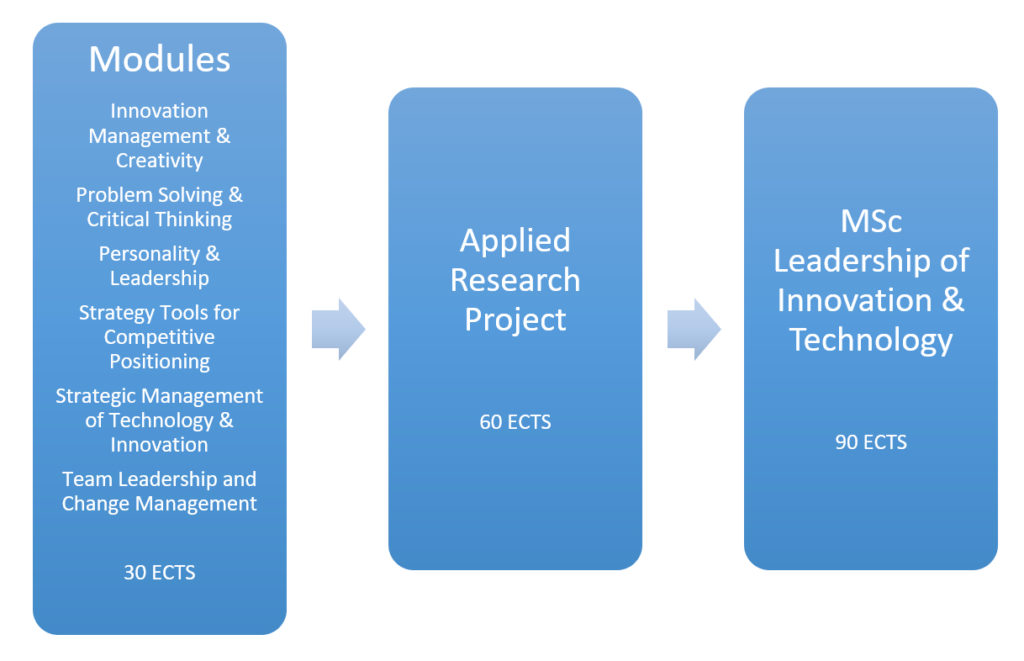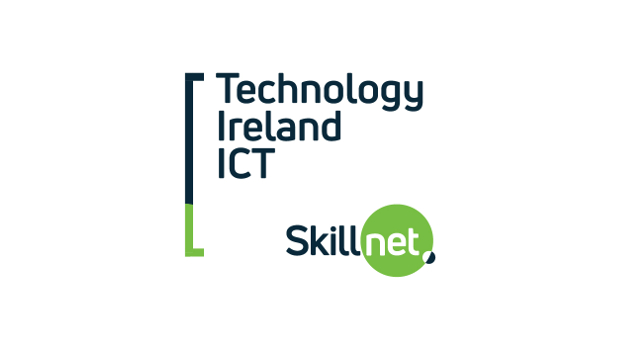The intersection of leadership and innovation in the digital world is a delicate, exciting and crucial space for companies and managers to navigate. Technologists need the energy and skills of leadership to be innovative and the tools of innovation to be better leaders.

A master’s degree delivered part-time and mainly online by the College of Business at Technological University for Dublin (DIT) in partnership with Technology Ireland ICT Skillnet is designed specifically to meet this need. The aim is to empower new and emerging leaders in technology with self-awareness and creativity — the essential building blocks for innovative teams, cultures and organisations.
The next course starts in April 2019.
It is grounded in the integration of personal, professional and
organisational development. It addresses key themes in leadership,
organisational behaviour, strategy, innovation, personal awareness, change
management, emotional intelligence, entrepreneurship, creativity and critical
thinking.
Participant Benefits
Learn how to use:
- Innovation Management and Creativity
- Problem Solving and Critical Thinking
- Undertake a Personality assessments
- Setting Strategic Direction and Creating Alignment
- Planning and Organising
- Building and Sustaining Relationships – forming
robust and effective relationships with all key stakeholder groups. - Delivering Results
- Strategy for Competitive Positioning
- Strategic Management of Technology
- Team Leadership and Change Management
- Assess and evaluate Organisational Design and
Culture - Advanced Diagnostic Models and Organisational
Analysis - Articulate visions that inspire others
The programme is highly practice focused and concentrates on the personal and professional development of the participants by honing their analytical, conceptual and critical thinking skills; developing personal, consultancy and research competencies; and building a detailed understanding of the tools, methodologies and frameworks to support advanced management capability.
Programme Structure
The programme is delivered in two-phases: The first phase includes a suite of six modules (detailed below) that address key development areas for leaders and entrepreneurial professionals in the ICT sector.
The second phase involves working on an applied and structured project. By conducting research in the context of their organisation and specialist area, participants build their personal expertise while contributing to important management issues in their organisation.
The research involved will typically focus on research ‘in’ their organisation rather than ‘on’ their organisation. It is more likely to involve cross-disciplinary work, thus contributing to the participants own practice and development.

Phase 1: Months 1-8
Delivery of the six modules in the first phase of the programme allows the participants to immerse themselves in current thinking in the key management areas. The work-based assignments will further allow them to test potential ideas for the Applied Research Project to be completed in the second phase of the programme.
Phase 2: Months 9-24
The research project requirement for the MSc will have a structured design that will see workshop based and webinar based training and sequenced outputs that build towards the delivery of a high quality research project with potential to deliver impact in the programme participant’s organisation.
Programme Assessment
The assessment strategy for each of the six modules in Phase 1 will be exclusively linked to work-based project assignments and reflective learning submissions. There will be no examinations. The final award of the master’s degree will be linked to the assessment of the research project undertaken by the participant with the support of the College.
Participants
The programme is aimed at existing employees in the ICT sector or employees working in ICT related roles in non-IT companies. (This includes owners and managers of small enterprises.) They are likely to be experienced and either already in leadership roles or planning on moving into such positions. Current participants come from: Ericsson, Citigroup, Three, Mc Cabes, Tableau, Fujitsu, Optum, Amazon, IBM, Mozobi, Novartis, Anthony Nicolas Group, Terabit, Sunbeam House, Whatbox.
Entry Requirements
Participants must have a Level 8 Honours Degree in a cognate discipline with a minimum of a 2:2. Candidates with significant work experience but without the requisite qualifications may be considered under a Recognition of Prior Learning process.
Time Commitment
In general, each module will be covered in 2 workshop days in College along with 3 online webinars. The total contact hours for each module will be 24 hours and the estimated self-directed learning hours for each module will be 76 hours.
The major project will involve a mix of face-to-face workshops and online webinars and support which will amount to a total of 48 contact hours. The total self-directed learning hours over the full 12 months of the project will be 1,1152 hours.
Applications
Applicants should submit their CV directly to Technology Ireland ICT Skillnet at info@ictskillnet.ie
RPA Fundamentals Online Masterclass
Robotic Process Automation (RPA) Fundamentals online course is designed to introduce the background, purpose, suitability, impact and basic steps for adopting and implementing RPA to senior management, global business services, shared services centre operations, IT functional management, process leads, continuous process improvement teams, transformation office members and team members.
For those with little or no knowledge of RPA, this course, delivered online via the Hackett Institute, gives you the learner an in-depth explanation and understanding of the terminology, processes and strategies within Robotic Process Automation. Functions such as auditability, scalability, operation, delivery and governance are all addressed in detail and give the learner a clear and concise knowledge of the theory and practice of RPA.
Next Course Starts 22 February 2019
Information from gbs@ictskillnet.ie
Ethereum Developer Course
This four-day intensive course (2 days followed by a break then a further 2 days) is for developers who want to take a comprehensive deep dive into all aspects of the Ethereum blockchain technology platform and its related smart contracts, and applications that interact with it.
The Course will be delivered by ConsenSys Academy who are developing the global blockchain ecosystem by bridging the Ethereum knowledge gap. These dedicated educators have the proven practical and academic experience to deliver a world class course. ConsenSys is the leading creator of blockchain ventures and education programmes with a proven track record of success. The team delivering the programme comprises of experts with world-class sector expertise in Education, Blockchain Technology, Enterprise grade Software Architecture, and Customer Success.
The training will allow participants to develop the core skills for Smart Contracts and DApps development, including key topics like security, gas optimisation and testing. Upon completion, participants will be able to code and deploy Smart Contracts, and designing the user web interface to use them.
Next Course Starts 22 March 2019
Information from info@ictskillnet.ie
Certificate in Enterprise Analytics
Online course providing certification in technical, functional, behavioural competencies.
This course helps to develop foundational knowledge of analytics and business analysis. Interactive exercises and relevant case studies examine the appropriateness of tools and skills to specific analytics challenges.
Delivered online by the world renowned Hackett Institute the course will enable you to:
- Develop foundational knowledge of analytics and
business analysis. - Develop a common “analytic language” of principles
and definitions to use in all of your - organisation’s analytic processes.
- Address all aspects of analytics from “asking
better questions” and critical thinking, to an analytic process, analysis and
analytic methods and techniques, and analytic tools. - Understand the elements that support analytics
such as data, organizations, stakeholders, communication, and change. - Use interactive exercises and relevant case
studies to illustrate each lesson and examine the appropriateness of
techniques, tools and skills to specific analytics challenges. - Deliver organisational goals of greater
visibility, reliability, and predictability through better analytics
decision-making, techniques, and tools - Be able to better analyse problems, suggest
solutions, and implement decisions - Understand analytical tools and techniques
- Understand and apply emerging trends in Analytics
Detailed proprietary content – 500+ pages of added materials on metrics, analytic techniques, templates, resources.
Next Course Starts 8 March 2019
Information from gbs@ictskillnet.ie







Subscribers 0
Fans 0
Followers 0
Followers